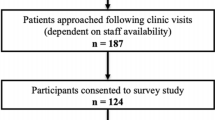Abstract
Because obesity is a grave public health concern, this study examined the percentage of disadvantaged women who recalled ever having received weight loss advice from a healthcare provider and factors associated with such advice. This study was part of a 5-clinic, cervical cancer prevention trial. Patients not immediately post-partum completed a Spanish/English survey; height and weight were also obtained. Of the 3,149 respondents (response rate 83%), 2,138 (68%) were overweight or obese (body mass index (BMI) ≥ 25); 94% reported a household income of <$35,000/year; 69% were Hispanic; 10% non-Hispanic black; and 40% completed the survey in Spanish. Only one-third reported ever having been told to lose weight. Based on BMI, these rates were 15% in the 25–29.9 range (overweight); 34% within 30–34.9; 57% within 35–39.9; and 73% ≥ 40. In univariate analyses, among overweight women, diabetes or English-speaking was associated with weight loss advice. In multivariate analyses, being older, more educated, and diabetic were associated with such advice. 48% of non-Hispanic whites, 31% of non-Hispanic blacks, and 29% of Hispanic had a home scale. Among disadvantaged women, obesity alone does not determine who recalls weight loss advice. Language barriers and lack of a home scale merit further study to address obesity.
Similar content being viewed by others
References
Ogden, C. K., Yanovski, S. Z., Carroll, M. D., & Flegal, K. M. (2007). The epidemiology of obesity. Gastroenterology, 132, 2087–2102.
Flegal, K. M., Carroll, M. D., Ogden, C. L., & Curtin, L. R. (2010). Prevalence and trends in obesity among US adults, 1999–2008. JAMA, 303, 235–241.
Berrington de Gonzalez, A., Hartge, P., Cerhan, J. R., et al. (2010). Body mass index and mortality among 1.46 million white adults. The New England Journal of Medicine, 363, 221–229.
Ko, J. Y., Brown, D. R., Galuska, D. A., et al. (2008). Weight loss advice US obese patients receive from health care professionals. Preventive Medicine, 47, 587–592.
Galuska, D. A., Will, J. C., Serdula, M. K., & Ford, E. S. (1999). Are healthcare professionals advising obese patients to lose weight? JAMA, 282, 1576–1578.
Stafford, R. S., Farhat, J. H., Misra, B., & Schoenfeld, D. A. (2000). National patterns of physician activities related to obesity management. Archives of Family Medicine, 9, 631–638.
Sciamanna, C. N., Tate, D. F., Lang, W., & Wing, R. R. (2000). Who reports receiving advice to lose weight? Results from a multistate survey. Archives of Internal Medicine, 160, 2334–2339.
Singh, S., & Lopez-Jimenez, F. (2010). Medically diagnosed overweight and weight loss in a US national survey. Preventive Medicine, 51, 24–26.
Mokdad, A., Bowman, B., Ford, E., et al. (2001). The continuing epidemic of obesity and diabetes in the United States. JAMA, 286, 1195–1200.
Wells, N. M., Evans, G. W., Beavis, A., & Ong, A. D. (2010). Early childhood poverty, cumulative risk exposure, and body mass index trajectories through young adulthood. American Journal of Public Health, 100, 2507–2512.
Sobal, J., & Stunkard, A. J. (1989). Socioeconomic status and obesity: A review of the literature. Psychological Bulletin, 105, 260–275.
Hays, R. D., Hayashi, T., & Stewart, A. L. (1989). A five-item measure of socially desirable response set. Educational and Psychological Measurement, 49, 629–636.
Fleiss, J. L., Levin, B., & Paik, M. C. (2003). Statistical methods for rates and proportions (3rd ed.). Hoboken, New Jersey: Wiley.
World Health Organization. (1997). Obesity: Preventing and managing the global epidemic: Report of a WHO consultation on obesity. World Health Organization, Geneva (WHO/NUT/NCD/98.1).
Linde, J. A., Jeffery, R. W., French, S. A., et al. (2005). Self-weighing in weight gain prevention and weight loss trials. Annals of Behavioral Medicine, 30, 210–216.
Wing, R. R., Tate, D. F., Gorin, A. A., Raynor, H. A., & Fava, J. L. (2006). A self-regulation program for maintenance of weight loss. The New England Journal of Medicine, 355, 1563–1571.
Hill, J. O. (2009). Can a small changes approach help address the obesity epidemic? A report of the Joint Task Force of the American Society of Nutrition, Institute of Food Technologists and International Food Information Council. The American Journal of Clinical Nutrition, 89, 477–484.
Acknowledgments
This work was funded by R01CA107015 to Dr. Radecki Breitkopf.
Conflict of interest
The authors report no conflicts of interest.
Author information
Authors and Affiliations
Corresponding author
Rights and permissions
About this article
Cite this article
Breitkopf, C.R., Egginton, J.S., Naessens, J.M. et al. Who is Counseled to Lose Weight? Survey Results and Anthropometric Data from 3,149 Lower Socioeconomic Women. J Community Health 37, 202–207 (2012). https://doi.org/10.1007/s10900-011-9437-8
Published:
Issue Date:
DOI: https://doi.org/10.1007/s10900-011-9437-8




